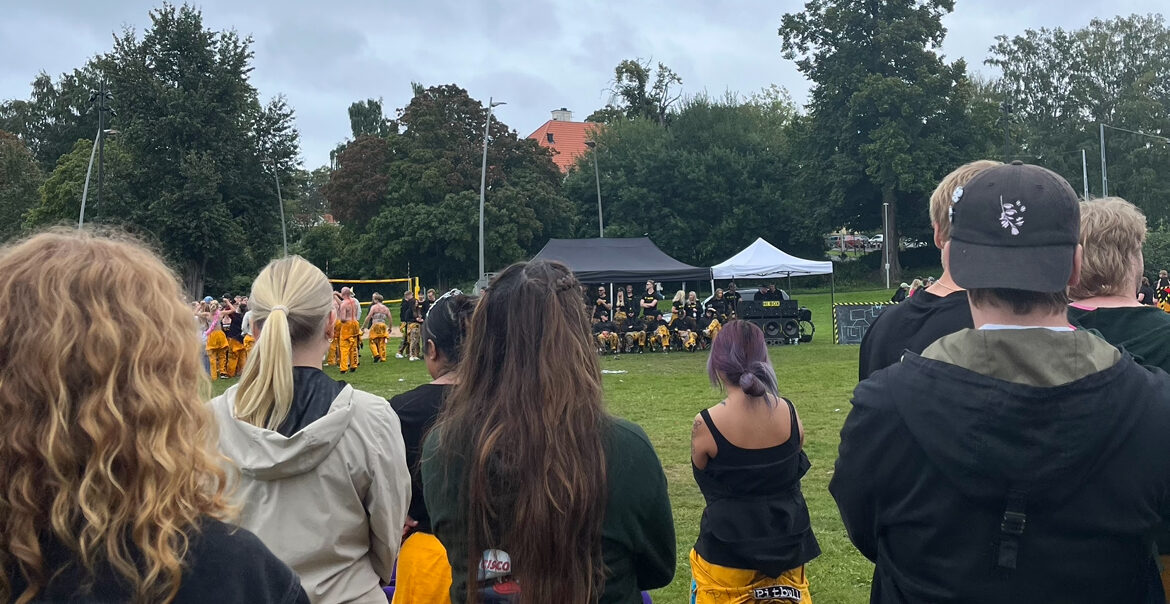[Correction: Since the initial release of this article and its subsequent removal, several changes have been made. These changes include, but are not limited to, statements from JSU, JSA, and HI TECH, adjustments to language and terminology, additional quotes from students, and a more thorough analysis of pressing student concerns.]
This article is an opinion piece reflecting the author’s personal views and is editorially independent of EDIT and any student union, association, or sub-organization.
EDIT writer Chris Ntonis on the ongoing discourse within JU’s international community: Many sub-organizations on campus have very few, if any, international members, despite JU being known for its numerous English-taught programs and a large number of international students.
A recent report by the National Higher Education Council reveals one in five students have faced discrimination in Swedish universities. When SVT interviewed students at JU, another pattern emerged: international students have a hard time making Swedish friends because they often feel excluded. What’s more, there’s been heavy discourse within JU’s international community regarding student sub-organizations only accepting Swedish and Swedish-speaking students. Ironically, notable issues appear even in the Jönköping International Business School, where the largest sub-organizations are infamous for their Swedish exclusivity. This begs the question: how exclusionary can student life be in a university known for its diversity? There have been countless controversies surrounding sub-organizations from every faculty at JU discriminating against international students. In this article, we will focus on JIBS due to it having the largest number of internationals in JU, but also the largest number of English-taught programs – 12. It is worth noting that JIBS’ Student Association (JSA) is the only association at JU that has managed to produce all their projects in English, which makes discriminatory claims all the more worth analyzing.
As we interviewed foreign JIBS students, all of them recounted discriminatory experiences from their first days in Jönköping during Kick-Off Week. Sexkreation, JIBS’ social committee, has predominantly consisted of exclusively Swedish members, which does not leave a good first impression for an inclusive university. When recalling their Kick-Off experience, a JTH student claimed, “I remember thinking multiple times, ‘One of the most international universities, huh?’ without seeing that represented in the association that’s meant to speak for our campus.” A 1st year JIBS student noted, “They act like they’re better than us. It’s offensive and belittling.” At the time of publishing, Sexkreation has not officially proclaimed they only accept Swedish and Swedish-speaking members. Yet despite applications from international students throughout the years, only a significant minority have ever been accepted.
When requested to comment on the accusations, Sexkreation stated, “We have worked closely with JSA […] to get an answer as to why only a small minority of internationals have been recruited into Sexkreation. […] We can without a doubt guarantee that Sexkreation would never discriminate based on background or ethnicity.” So if that’s the case, why is the most international faculty’s social committee still almost fully Swedish? How many discussions will it take to get a clear answer?
It is also crucial to mention the issues surrounding Fadders and Head Fadders during Kick-Off. Apart from the very small percentage of non-Swedish-speaking Head Fadders for the Fall 2024 Kick-Off, in the latest Head Fadder training organized by the university’s Student Union (JSU), there was a significant language barrier; according to students present, many trainings and communication were held in Swedish with no translation in place. This ought to be a concern for all JU students — if your fadders won’t speak a language you understand, what impression does that leave you with?
Fortunately, this doesn’t seem to be every student’s experience. One student noted, “Sometimes sexmasteries prefer Swedish, but as soon as fadders or others point out [someone] doesn’t speak Swedish, the sexmasteries switch [to English] straight away.” This can only make us hopeful that change is imminent and that, soon enough, no student will be able to recall an exclusionary experience during Kick-Off.
Another aspect of international student life at JU is the sub-organizations that aim to connect foreign students with Swedes. HINT, JTH’s international sub-organization, has found great success among JTH students. Matilda Nilsson, ex-President of HI TECH, attributes their success to JTH having a higher need for international representation within the faculty. In contrast, JIBS’ International Crew lacks visibility against larger sub-organizations – a sentiment shared by multiple anonymous sources close to it. One source claims this problem stems from “issues within JSA and a lack of structure within the Student Union,” as well as a lack of funding, which “JSA has a very strange structure to.” It’s evident that more money can lead to higher visibility. Especially when it comes to inclusion efforts, associations ought to facilitate funding processes and be in frequent communication with sub-organizations on how they can stand out more among international students.
Transparency in funding is also crucial. Julia De Geus, president of JSA, explained that some JSA sponsors usually choose to fund specific sub-organizations’ events (like NextStep, Ball Committee, and Spring Inspiration) due to their pre-existing student visibility. Coincidentally, these are sub-organizations run by majority Swedes, with almost no international students on their Boards. If these are the associations that are heavily promoted among students, why are they not representative of the 50% international student body that JIBS amasses? Why does it appear as if these associations are purposely not accepting international students?
Significant complaints have also arisen regarding Spring Inspiration, a sub-organization notorious for its international exclusion. A past member of Spring Inspiration alleged that their managers are usually friends of previous managers and almost always Swedish. Despite the sub-organization insisting on their inclusivity efforts, a number of their practices have been called out due to their discriminatory and exclusionary nature. A source who was part of the 2023 fashion show stated there were no makeup artists for people of color, which directly clashes with their inclusivity claims. Recently, the sub-organization has made efforts to diversify its board and model selection. Yet students close to the association claim all international members were “grouped into one team.” “For me, this is not a coincidence,” declared an anonymous source. If these claims are true, what’s stopping such a well-known and funded sub-organization from adhering to their own self-imposed values? EDIT reached out to Spring Inspiration for a comment but did not recieve an answer.
Ball Committee, on the other hand, responded, “These past few years, the very majority of applicants were Swedish women. However, we advertise ourselves equally to international students as Swedish students.” Here, a different angle of the issue emerges: are international students just not applying to predominantly Swedish sub-organizations? This is a chicken-and-egg situation that can be hard to analyze, but definitely possible to fix.
Despite what sub-organizations might think, Instagram posts in English are not enough. Make it explicitly clear you’re expecting international applications, create an Equal Opportunities mechanism in your application process, set quotas for international students, and promote your sub-organization in international events, among other actions to ensure international students are actively encouraged to apply. Furthermore, associations must hold sub-organizations accountable for their lack of inclusivity, not just wait for change to happen. On a positive note, JSA recently condemned NextStep for their recruitment outcomes, since their high percentage of international applicants was not reflected in their board, which was once again predominantly Swedish-speaking.
This is obviously an issue that’s existed for many years and that many parties throughout the university are constantly working towards resolving. JSU President, Jose Alvarado, stated that the Student Union has been working on this issue for years alongside JU. Similarly, Monica Cannmo, Head of JU’s Department for Educational Support, says to SVT, “We work actively with the integration issue and have it high on the agenda. You can always get better.” Yet these are generic statements that don’t provide much insight into how this issue is being fixed.
When EDIT asked Jose Alvarado, JSU President, about the practical involvement of the Student Union in sub-organization diversity, he noted the role of the Association Coordinator, responsible for directly communicating policies and bylaws to sub-organizations. At the time of publishing, EDIT’s Editors in Chief have not been provided any information or guidelines for promoting diversity and inclusivity within the sub-organization, and this position currently remains unfilled. On the other hand, JSA is a good example of how faculty associations ought to be practically involved in sub-organizations’ recruitment process. One JSA board member has to be present in every interview conducted in JSA’s sub-organizations, and since August 2023 there’s been an “Inclusivity Form” implemented – a set of criteria that take into account international experience and aim to improve inclusivity within JIBS. We look forward to more associations implementing practical, hands-on measures to ensure diversity that are not just theoretical policies.
All in all, such exclusionary experiences are steering students away from engaging in student life and participating in associations and sub-organizations. International students feel intimidated to apply to sub-organizations they are not represented in. Conversations about these topics are happening daily on campus, yet change seems slow to happen. We ought to acknowledge the efforts of the Student Union and each association to be as inclusive and just as possible, yet the student experiences highlighted above prove there’s still a long way to go. A way that requires more transparency, communication, and accountability.
The questions in this article are posed to hold every association and sub-organization accountable for their lack of diversity, but also to make you consider a reality where this is not the norm. As the new semester approaches, remember that you have a place in every union, association, and sub-organization. And if you’re managing applications for your own sub-organization, think twice before recruiting. What do you want your association to be?
Writer: Chris Ntonis


